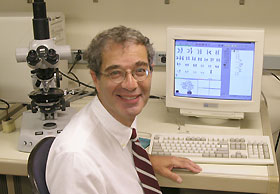|
This is an archived article.
For the latest news, go to the Advance Homepage
For more archives, go to the Advance Archive/Search Page. |
||
|
Genetics Expert Promotes Serum
A group of demonstrators, including several individuals with Down Syndrome, barged in and began protesting the meeting and the science. "No more testing!" they chanted.
The scientists attending the meeting invited the protestors to speak. "We were interested in their point of view," Benn says. "It was useful to hear. But the scientists concluded after the protestors spoke that they were missing the point of the testing." It's often misunderstood, he says. Serum screening is nothing other than risk assessment and evaluation. "You take each individual patient and evaluate her personal risk for an affected pregnancy," he says. Some will come out with high risk and some will come out with low risk. "The vast majority," he says, "will come out with a low risk number, and therefore receive considerable reassurance." There's good medicine behind serum screening, and a sociological factor as well: More women are deferring their pregnancies until later in life, at ages 35, 40, and even older. The older they are, the greater the chance for a chromosome abnormality. Disorders associated with chromosome abnormalities include Down Syndrome and other conditions where there is a combination of physical and mental handicap. Amniocentesis - an invasive procedure that uses ultrasound and a sample of the amniotic fluid surrounding the fetus to seek chromosomal abnormalities - was developed as a tool to help older mothers assess their risks. But amniocentesis itself poses risks to the pregnancy, Benn says. Serum screening, however, uses the blood of a mother and sophisticated chemical analysis to assay for a variety of chromosome abnormalities. During the past decade, screening has resulted in a substantial reduction in the number of amniocenteses performed. A pregnant couple's options depend upon what the screening reveals. In most cases, he says, the couple will find comforting information. In some cases, the screening will reveal the need for further tests, such as amniocentesis. "The unexpected birth of a child with Down Syndrome or some other chromosomal abnormality can be devastating," he says. "A couple at risk can often put their minds at ease with a simple screening test." Genetics has been central to Benn's professional life. He first encountered chromosomes while working on a master's degree project at the University of Birmingham in the United Kingdom. "The first time I looked through a microscope, I was enthralled at what I saw," he says. "I felt I was looking at something very beautiful and full of wonder. I've pursued it ever since." He earned his Ph.D. from Birmingham University, England, and did a post-doc at the University of Pennsylvania. After a couple of private sector scientific jobs in New York, during which he was also an adjunct faculty member at New York University and New York Medical College in Valhalla, he joined the Health Center in 1990 as director of laboratory services in the Division of Human Genetics. He has published more than 75 abstracts, nearly 100 papers, edited a book, and written half-a-dozen chapters. He was recently invited to write an editorial for the international medical journal The Lancet. Benn says the need for good screening tests is increasing, as the trend of women deferring childbirth until later in life continues. He is collaborating with Dr. James Egan, associate professor of ob-gyn, on the best way to combine serum tests and ultrasound. "The whole area of serum screening is in flux," Benn says. "One area of considerable interest in the medical community is moving testing earlier into the first trimester instead of the second trimester. That's really taken off in a major way in the U.K. and elsewhere in Europe." The United States lags behind for a number of reasons, he says, but chiefly because of patient referral patterns. Here, patients have pregnancy tests early but often prenatal care doesn't begin until the 12th week, by which time the window of opportunity for first trimester testing has closed. |
 eter Benn, a
professor of genetics and developmental biology and
director of the Human Genetics Laboratories at the
School of Medicine, was at a meeting in London not
long ago commenting on innovations and advances in
serum screening - prenatal genetic testing for
congenital abnormalities - when the meeting was
interrupted.
eter Benn, a
professor of genetics and developmental biology and
director of the Human Genetics Laboratories at the
School of Medicine, was at a meeting in London not
long ago commenting on innovations and advances in
serum screening - prenatal genetic testing for
congenital abnormalities - when the meeting was
interrupted.

